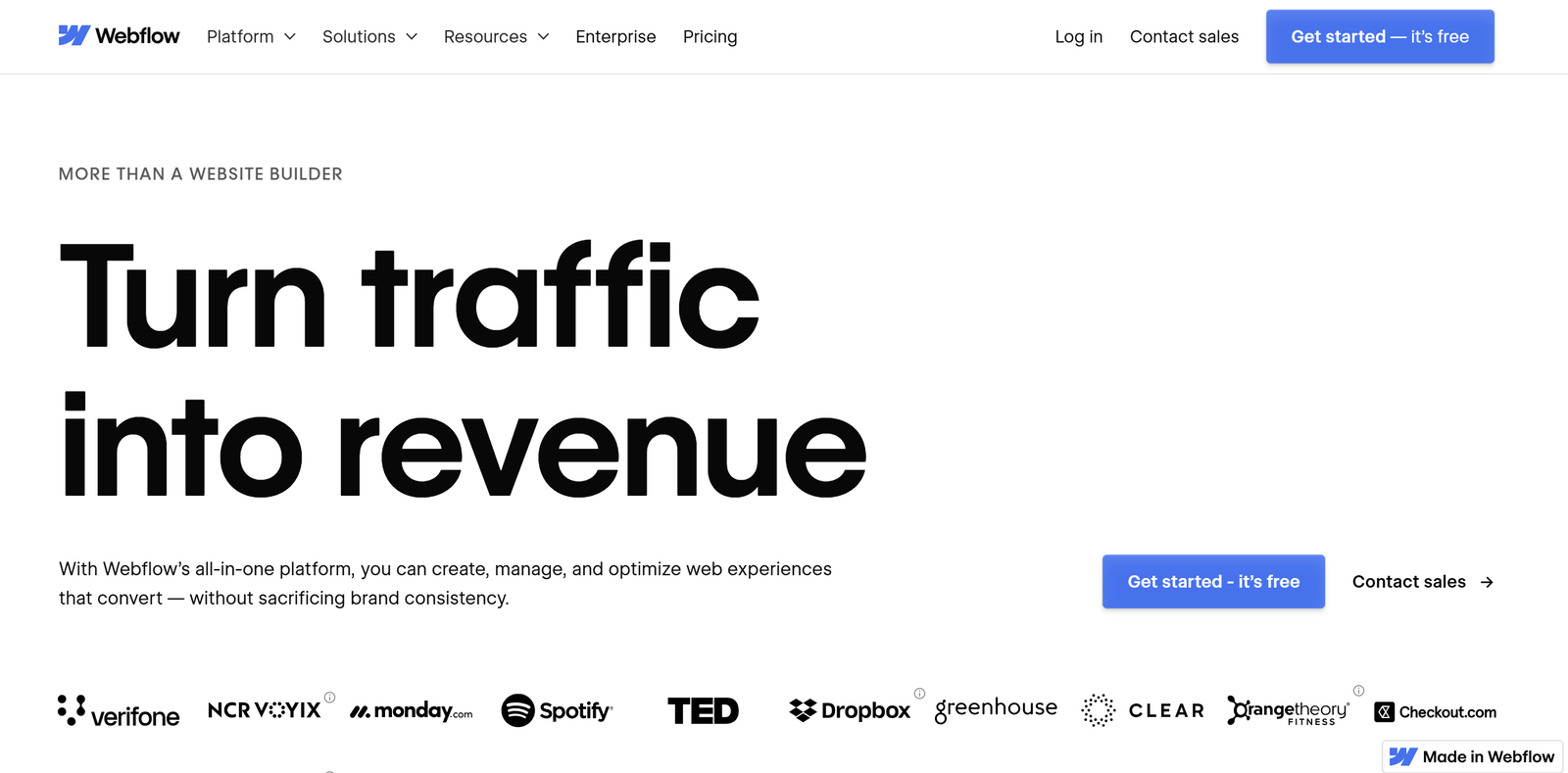Webflow Review 2025 – Visual Website Builder Solution for Agencies & Businesses
Full Q&A Analysis of Webflow Features, Pricing, Integrations & White-Label Potential
What is Webflow and who is it for?
Webflow is a visual-first, no-code website builder and CMS platform created for agencies, marketing teams, designers, and businesses seeking sophisticated website development without traditional coding. It provides advanced design flexibility, enterprise-grade hosting, and comprehensive content management capabilities that bridge the gap between design freedom and technical functionality.
What is the overall rating and summary of Webflow?
Overall Rating: 8.5/10
✅ Brand: 9/10
✅ White-Labeling: 7/10
✅ Features: 9/10
✅ Lead Gen: 8/10
✅ Support: 7/10
✅ Integrations: 9/10
✅ Scalability: 9/10
✅ Pricing: 6/10
✅ White-Label Services: 7/10
✅ Roadmap: 8/10
Webflow stands out as a premium visual development platform that combines design flexibility with enterprise-grade capabilities. While pricing can be steep and the learning curve challenging, it delivers exceptional value for agencies and businesses prioritizing custom design and scalability.
How does Webflow present its brand and visual identity?
Webflow presents a modern, professional brand identity focused on visual design excellence and technical sophistication. The platform emphasizes clean, intuitive interfaces with comprehensive customization options including custom domains, SSL security, and enterprise-grade hosting. Users can fully customize their site's branding, colors, typography, and layout without design constraints, while maintaining pixel-perfect control over every visual element.
What are the white-labeling capabilities of Webflow?
Webflow offers moderate white-label capabilities primarily through its higher-tier plans. Users with Professional or Team plans can replace the Webflow logo in the CMS with their own or client logos. The platform allows custom domain connections, JavaScript file whitelabeling, and CMS branding customization. However, Webflow's white-labeling is more limited compared to dedicated white-label platforms, requiring manual setup and lacking comprehensive partner portal features.
Which core features and functionalities set Webflow apart?
Webflow's distinguishing features include: Visual CSS Grid and Flexbox capabilities for precise layouts; Advanced animation and interaction tools powered by GSAP; Composable CMS with headless API capabilities; Real-time collaboration and page branching for teams; Enterprise-grade hosting with CDN and 99.99% uptime SLA; Native localization for global audiences; and AI-powered design assistant for content generation. These features enable pixel-perfect design control while maintaining scalability.
How does Webflow support business growth and lead generation?
Webflow includes native analytics through Webflow Analyze, A/B testing via Webflow Optimize, and comprehensive SEO tools for organic growth. The platform supports unlimited form submissions on paid plans, integrates with major marketing tools like HubSpot, Mailchimp, and Zapier, and offers advanced CMS capabilities for content marketing. Enterprise users get dedicated customer success managers and priority support for growth initiatives.
What support options are available to users?
Webflow provides email-based support for most users, with priority support for Enterprise customers. The platform offers extensive documentation through Webflow University, community forums, and comprehensive video tutorials. While some users report mixed support experiences, many find the knowledge base thorough and responses helpful when received. Enterprise customers receive dedicated account managers and faster response times.
How well does Webflow integrate with other tools?
Webflow excels in integrations with 300+ available apps in the marketplace. Key integrations include marketing automation (HubSpot, Mailchimp), data synchronization (Zapier, Airtable, Whalesync), analytics (Google Analytics, Hotjar), e-commerce (Shopify), and membership tools (Memberstack, Outseta). The platform offers robust APIs for custom integrations and headless CMS capabilities for advanced implementations.
Is Webflow scalable for growing businesses?
Webflow is highly scalable with enterprise-grade infrastructure powered by Cloudflare. The platform handles traffic surges with ease, offers unlimited bandwidth on higher plans, and provides 99.99% uptime SLAs for Enterprise customers. Composable architecture allows for headless implementations, while advanced collaboration tools support large teams. The CMS scales to handle thousands of items and multiple localized versions.
What is the pricing structure and how does it compare to competitors?
Webflow Site Plans: Basic ($14/month annually), CMS ($23/month annually), Business ($39/month annually). Workspace Plans: Core ($19/month annually), Growth ($49/month annually). E-commerce Plans: Standard ($29/month annually), Plus ($74/month annually), Advanced ($212/month annually).
Competitor Comparison: Webflow is premium-priced compared to Squarespace ($16-52/month) and Wix ($16-45/month) but offers superior design flexibility. WordPress costs less for basic hosting but requires additional plugins and development, making Webflow cost-effective for design-intensive projects.
What profit opportunities are there for agencies through white-label reselling?
White-Label ROI Potential: Agencies can leverage Webflow's partner program and certified partner status to command premium rates. With typical agency markups of 50-200% on web development, agencies charging $5,000-15,000 for custom Webflow sites while paying $200-500 monthly in platform costs can achieve healthy profit margins. Specialized Webflow agencies report 20-50% higher project values compared to traditional web development due to faster delivery and superior design capabilities.
How transparent and innovative is Webflow regarding updates and its future roadmap?
Webflow maintains active development with frequent feature releases documented in their updates section. Recent major launches include real-time collaboration, AI Assistant, GSAP integration, and advanced analytics. However, the company lacks a public roadmap, which some users find frustrating. Innovation pace is strong with significant investments in AI, enterprise features, and developer tools, though transparency around timelines could improve.
What practical recommendations are there for digital marketing agencies using Webflow?
Key Recommendations: 1) Invest in Webflow certification and Client-First methodology for professional standards; 2) Leverage component-based design systems for faster client delivery and consistency; 3) Master CMS implementation to empower clients with content management independence. Focus on high-value niches like SaaS, professional services, and e-commerce where Webflow's capabilities justify premium pricing.
What is the final verdict and overall rating for Webflow?
Final Rating: 8.5/10
Webflow excels as a premium visual development platform ideal for agencies, designers, and businesses prioritizing custom design and scalability. Strengths include exceptional design flexibility, enterprise-grade hosting, comprehensive integrations, and powerful CMS capabilities. Limitations include steep pricing, learning curve complexity, and limited traditional white-labeling. Best suited for agencies serving mid-to-enterprise clients, marketing teams needing design control, and businesses requiring scalable, custom websites.
